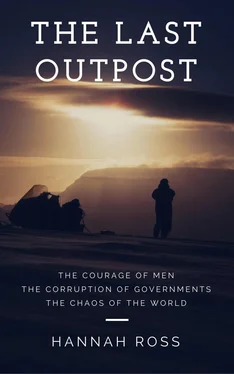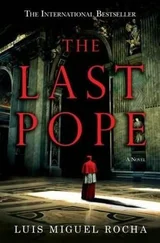“Thanks, Zoe. You’re right. As anxious as people will be to keep in constant touch with their families during this time, we must consider the station’s overall needs. Making the station available for briefing with headquarters takes precedence over private emails.”
“Above all,” Scott went on, “it is imperative that the work at McMurdo station continue as usual. The Antarctic Program is not supposed to be affected by war or political considerations. At this time, we can see ourselves as a stronghold of normalcy in a world that has been turned upside down. We will carry on, business as usual, as much as we can, and hope to emerge into a more peaceful world at the end of the winter.”
He stopped, and was surprised to hear his words received by a spontaneous outburst of applause. “Way to go, Buck!” Jerry called out. “Lindholm would have been proud to hear you.”
“Everyone, please brief your teams accordingly. I will get back to the office now, and send an email to all the workers,” Scott said, and people got up and began filing out of the club. Some were flipping their phones out at they walked, eager to connect to the news websites. Others stopped to clap him on the back and say a few words. Finally, it was just him and Nash left, shooting each other hostile looks from opposite ends of the room.
Scott strode over, until no more than three feet separated them. “For everybody’s good, Nash,” he said, “I suggest that you should be among those who leave McMurdo on that plane. I can’t force you to resign, but I can advise you that you would be better off elsewhere.”
Victor’s thin lips twitched in disdain. “I have given twelve years of my life to McMurdo,” he said. “Twelve goddamn years, without a single holiday. You won’t be the one to shove me out, Buckley.”
Scott shrugged. “Suit yourself,” he said. “But I just have to warn you, Nash, that I won’t put up with any of your tricks. You will comply with the regulations of the Antarctic Program. You will honor the Treaty. You will respect the wildlife. And you will honor people,” he went on. “All people — do you understand? — or you’ll wish you had left while you still had time.”
“You won’t threaten me, Buckley,” Nash said, spun around, and strode out.
With seven hundred people vying for a hundred seats, composing the passenger priority list was a pain, but Scott managed it with due help from the staff. Many gave up on their plan to go home for the winter, and volunteered to remain at the station. Others took it stoically, realizing that others needed that passage home more than they did. Younger people stood aside in favor of older, single people in favor of those who had families. Several even expressed their satisfaction at having to stay, considering McMurdo as one of the safest retreats in the world at the present time. Nevertheless, there were some cases of severe pressure, hysteria, and even bribe attempts, from people desperate to get home. Scott did not allow himself to waver, however, and on the appointed day, fifty tourists and a hundred staff members boarded the plane with reasonable dignity, and without undue pushing and shoving.
A few days later, just before China bombed Japan and the world plunged deeper into the dark abyss of chaos, McMurdo had another stroke of luck — a supply ship arrived from Argentina, with room for another hundred passengers, which turned into a hundred and fifty with some desperate pleading and emergency accommodations. Another priority list was compiled, and the ship sailed away, leaving a total of around seven hundred people to bear the winter at McMurdo.
There would be no more planes or ships until the end of the season. The war was rising, and darkness was falling. The days were shortening rapidly, and Ross Island was fast approaching the last sunset, which was due to signal the beginning of the long sunless winter.
It was with a sinking feeling that the remaining population of McMurdo watched the last ships leave. With them was gone the last chance of rejoining families and coming home before the Antarctic winter. The two hundred and fifty year-round workers did not plan on anything else, but the remaining four hundred and fifty were pretty desponding, and kept glued to the news broadcasts as if to a lifeline. Not that the news supplied any particularly reassuring information. On the contrary, there was a new disaster to come to terms with every day — the Eiffel Tower, symbol of old-class well-to-do Europe, lay in ruins; London and New York were bombed; more soldiers were recruited every day, but it didn’t look like anything availed against the Korean and Chinese expansion.
The broadband connection was so overburdened that private internet calls were limited to five minutes once a day, and those who didn’t comply were fined. Finally, unwilling to let general gloom sink in, Jerry Gordon raised a campaign for avoiding any talk about politics or news in the clubs after working hours. Many recognized this as a wise measure, but the avoidance of public news didn’t do much good. People would sit gloomily at the bar, mostly in silence, and from time to time they sighed and said things like, “I wonder what Tom is doing right now — he has been deployed for two months, and I haven’t heard from him since”, or “I hope to God they have enough bomb shelters in Baltimore — you never know what will happen tomorrow.”
The people of McMurdo did not really fear for themselves, but there was a general depressing atmosphere of helplessness, despondency and gloom, that settled over the station like a black cloud. People went on about their business as usual, not slacking off and not cutting corners, but an unspoken question lingered in the air: is there even a point to keep going, when there might be no Antarctic Program, no United States, no world as we know it come spring?
Scott had his own matters to weigh upon his mind. The divorce papers had not come yet, but this was unsurprising, as all private mail via New Zealand arrived very sporadically these days. Brianna hadn’t responded to his email, though his tracking program enabled him to know that the message had been opened, and he didn’t attempt to make another internet call, as he knew it would take far more than five minutes, and he had to set an example for the McMurdo staff.
One day, just as he was heading for lunch, Scott ran into Zoe in the corridor. She was crying surreptitiously and rubbing her eyes furiously, and turned away when he approached. He stopped her by placing a hand on her shoulder.
“What’s up, Zoe?”
She looked at him, as if debating within herself how much to tell him, and eventually said, “I have just come back from the clinic.”
“The clinic?” Scott repeated with a jolt of dread. “Are you ill?”
“Not yet, but with the way things are going, I will be soon. I asked for some antidepressants, or maybe some anxiety meds, or both, but Dr. Hope refused to give me any. Said that other people might need them a lot more than I do once darkness really kicks in, and that she won’t squander the station’s supply on those who,” Zoe paused and her voice became infused with sarcasm, “ just need to get a grip on themselves .”
Scott frowned. “Are things really that bad?” he asked. “Do you generally take antidepressants during the winter?”
“Don’t be ridiculous. If I did, I would have quit my position a long time ago. But with things going on the way they are, and me only able to talk to my family once a week or so… I need those meds to keep from going crazy, Buck. Hey,” she stopped, as if hit by a sudden idea, “you can make Dr. Hope give me those pills! You are the general overseer, aren’t you?”
“Yes, but I don’t want to interfere with Dr. Hope’s policy. She has been running the clinic for many years, and she knows what she is doing. I’m sure that, if she had thought you really need antidepressants, she would have given you some.”
Читать дальше












